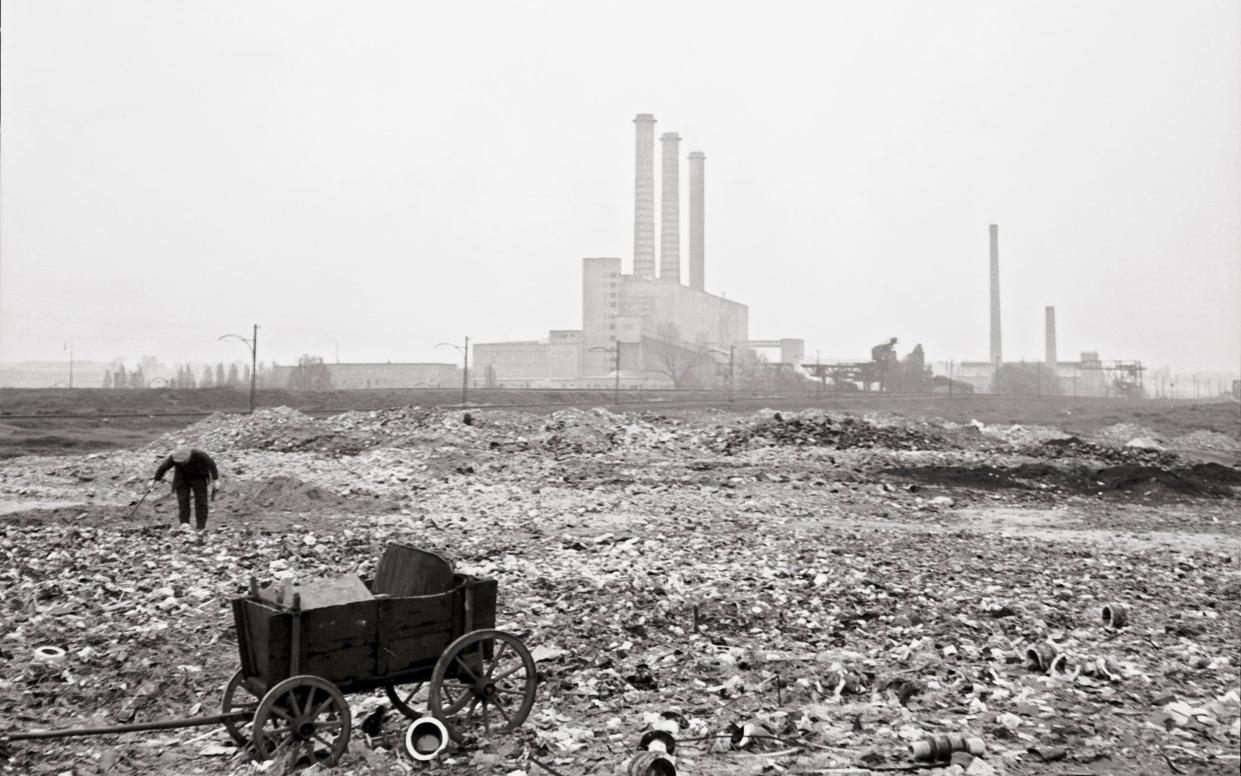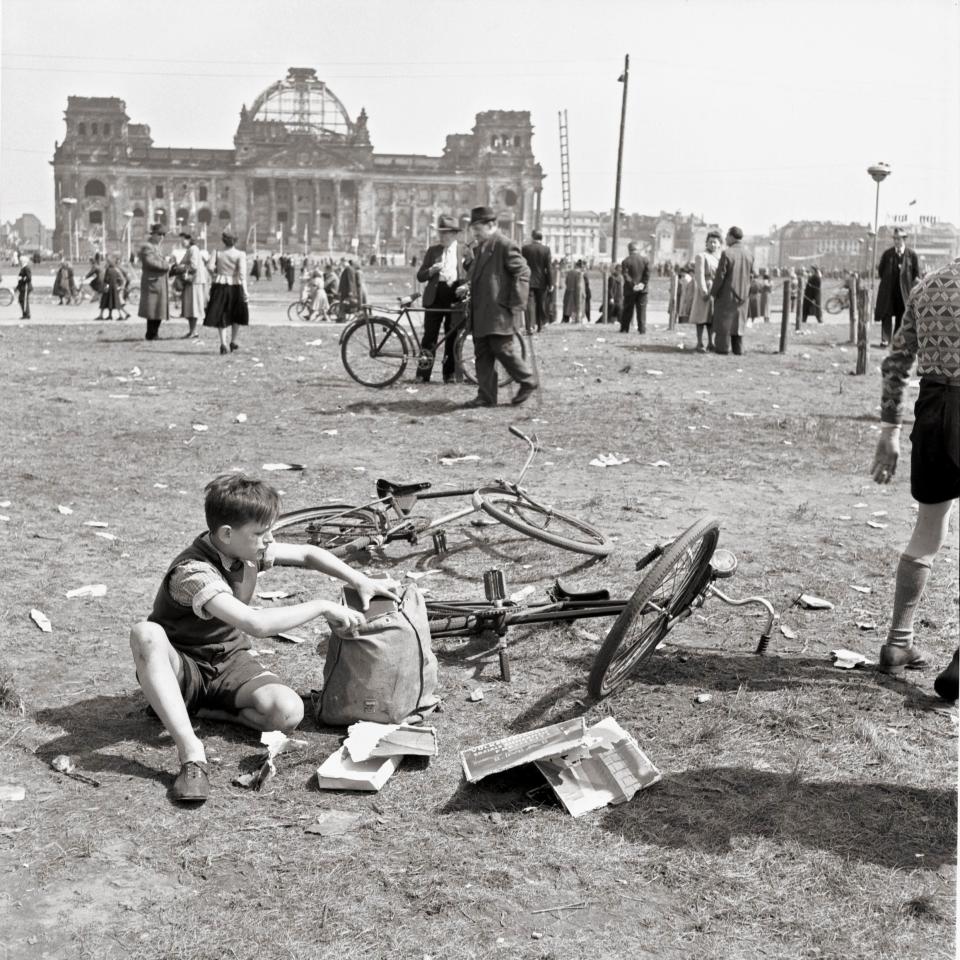Life after 'zero hour': how Germany recovered from the horrors of Nazism

- Oops!Something went wrong.Please try again later.
- Oops!Something went wrong.Please try again later.
German is a very beautiful language, but its propensity to cluster words can get in the way of elegance. One of the most impressive – and conceptually important – of these behemoths is Vergangenheitsbewältigung, roughly translated as “assessing the past” and applied in particular to Germany’s inward examination of the reasons for its descent into Nazism, and who or what to blame for it.
Harald Jähner’s magnificent book Aftermath (fluently translated by Shaun Whiteside) is part of this continuing process. Drawing on the huge literature listed in the bibliography, it takes a lucid overview of the astonishing decade following the defeat of Nazism and the partition of Germany between the Western allies and Soviet Russia. Although it embraces subjects of explosive ideological controversy, the story is told with judicious impartial intelligence and a light touch: Jähner has no axe to grind and he casts his net wide, fully aware of the large patches of grey morality through which he is treading. There are great lessons in the nature of humanity to be learnt here.
He starts, of course, in the unimaginable horrors of Stunde Null: zero hour. With cities reduced to rubble by bombing, 40 million people were displaced, homeless, refugees or evacuees, as camps disgorged sick prisoners and soldiers trekked home from the eastern front. Racism turned against the poorest migrants, and the vicious winter of 1946-47 brought many to starvation. Black market criminality and crude barter was endemic, with small fortunes made out of trade in the GIs’ Lucky Strikes.
Yet, as Jähner explains, at the same time “the joy of survival erupted with great force”. In the chaos lay opportunities to start again. The young danced frenziedly in basement clubs and there was wild love-making that resulted in waves of venereal disease (or “Veronika Dankeschön”, as it was known to GIs). Despite the collapse of so many basic institutions, people found ways to cope and adapt. Germans learnt that “a society is something that can organise itself without central orders or guidance” and that “capitalism always gives a chance to the resourceful”. Out of these ruins, ironically, came a generation that developed into “one of most law-abiding in history” and one that achieved a miraculous economic recovery, too.
The turning point came in 1948 – the year that saw the Marshall Plan loan, the brilliantly managed introduction of the new currency of the Deutschmark, and the Russian blockade of Berlin that resulted in the spectacular airlift operation. All these events intensified the Cold War, but they also clarified the relative values of the western and eastern zones, and encouraged a new sense of possibilities. This was the year in which Heinrich Nordhoff took command of Volkswagen: Hitler had entertained grand ambitions for this firm to rival Ford’s Model T through the manufacture of the Beetle, but these were never realised. Nordhoff became one of the great heroes of reconstruction by taking a firm grip on the business, engaging with new mass-production methods and turning the shanty town of Wolfsburg into “the epitome of factory society”, industrially efficient and motivated.

Another key figure of the period is Beate Uhse, a former Luftwaffe pilot who published sexual advice in the form of pamphlets advocating “marital hygiene” before she invented the sex shop in the early 1960s. Unabashed, straightforward, an advocate of nudity and “comradely marriage”, Uhse stood for simple male-female bedroom pleasures without obscenities or perversions. Her influence on German women in particular was comparable to that of Kinsey in the USA; they needed help, inasmuch as so many of their menfolk had returned from the war in a terrible physical and emotional state, incapable of relating to their wives or their offspring.
Jähner discusses other cultural changes including the Western bloc’s sponsorship of abstract art, a phenomenon that came to symbolise a wider freedom of expression in contrast to the Eastern bloc’s reactionary and repressive insistence on “socialist realism”. I wish he had devoted a chapter to music – something so fundamental to Germany’s sense of itself – and it seems odd that there is absolutely no mention of the rehabilitation of Wagner at Bayreuth. But this is a subject that has been extensively covered elsewhere, and perhaps Jähner preferred to devote limited space to less trawled fields such as popular magazines and the pre-Fassbinder and Herzog era of German cinema.
The most haunting material in the book, however, comes in its final chapters, where Jähner addresses the Vergangenheitsbewältigung question. In May 1945, Nazism effectively evaporated, defying the allies’ expectations that elements would continue to offer violent resistance to the occupying forces. Instead “it seemed as if the fascism in the souls of the Germans had vanished into thin air” as “most of them dropped their loyalty to the Führer as if flicking a switch”. The Nuremberg trials of 1945-46 may have caused enormous interest elsewhere, but in Germany itself, “the reaction was broadly one of indifference”.
With almost everyone implicated in Nazism by association, there was little settling of scores, little revenge, and little breast-beating: either a spirit of mutual forgiveness, or more probably a sense of shame, kept people quiet and focused on their own immediate miseries. For want of anyone else to take their place, many Nazi personnel remained in place as civil servants and in the judiciary. Of the Jewish genocide in particular, almost nothing was said. People could only bear to look forward.
Not until the mid-1960s, with social democracy firmly established in the federal West, Auschwitz officers belatedly on trial and the concept of the Holocaust taking hold of the popular imagination, did Germany dare to confront the recent past. Even then it emerged in the rage of the young against their parents rather than in the parents themselves.
Whatever one thinks of the politics of the Baader-Meinhof, Rudi Dutschke and the 1968 student revolutionaries, they at least forced their elders to take an overdue look in the mirror. Over the ensuing half-century, they have been unable to look away.
Aftermath is published by WH Allen at £20. To order your copy for £16.99 call 0844 871 1514 or visit the Telegraph Bookshop

